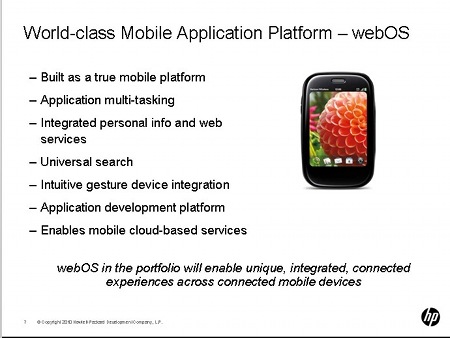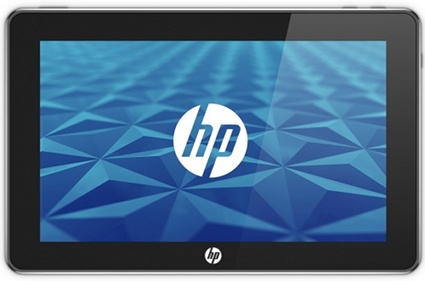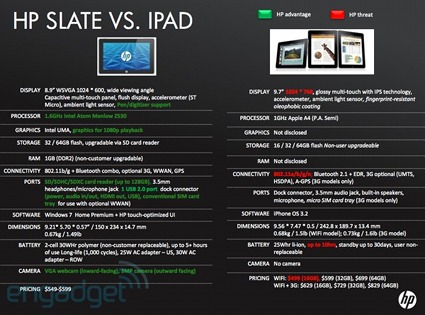HP confirms tablets for both Windows 7 and WebOS
Jul 23, 2010 — by Eric Brown — from the LinuxDevices Archive — 1 viewsHP has confirmed it plans to release multiple tablets, including some running Microsoft's Windows 7 and others running the Linux-based WebOS it acquired along with Palm. The announcement follows sightings on the web earlier this week of HP's “Slate 500,” a Windows tablet with an 8.9-inch touchscreen, dual cameras, and a 1.6GHz Atom processor.
Turns out the rumor mill did rather good work of parsing together Hewlett-Packard's tablet plans. Still, Todd Bradley, executive vice president of HP's personal system group, and Jon Rubinstein, the former CEO of Palm, now reporting to Bradley, offered confirmation of the company's intentions at the 2010 Fortune Brainstorm Tech conference July 22.
"I think you'll see us with a family of slate products, clearly a Microsoft product in the enterprise, and a WebOS product broadly deployed," Bradley said on stage at the Aspen conference, seated beside Rubinstein.
Explaining that the market will be big enough to sustain multiple products, Bradley added, "Slates are going to be an enormous category. This is just in its infancy."
In a July 20 report, ABI Research nearly tripled its tablet shipment forecast for 2010 to 11 million units. The research firm expects fourth-quarter sales to boom, following a number of competing devices making their way to retail shelves in September. It likewise views the segment as still young and likely not to break into the "mass market" until 2013.
Bradley notably left out mention of a tablet running Google's Android OS, which HP was reported to have temporarily shelved as it focuses on getting its first WebOS product to market. The PC-maker acquired the well-regarded OS during its $1.2 billion purchase of Palm, earlier this year.

A slide from HP's presentation announcing the acquisition of Palm
(Click to enlarge)
Since the purchase, HP has been open about its plans to release WebOS on a variety of devices, beyond simply the smartphones it currently runs on, and Rubinstein has commented that with HP's backing, WebOS — which he's generally credited for creating — will be able to reach its full potential.
The open-source OS is said to be particularly easy to develop for, and a growing app store and easy-to-update operating system are likely to benefit HP.
"I think it's important to have control over the entire user experience and really deliver great consumer products," Rubinstein said, according to reporting from Fortune. "If you really want to deliver a great experience, in this case, the HP experience, you want your own OS."

HP's Slate
HP first announced the Slate (above), a tablet reported to run Microsoft's Windows 7 Home Premium, at the start of the year. While subsequent rumors suggested that the Slate had been scrapped, it appears to be on track for release, as our sister publication, WindowsForDevices reported earlier this week.

A presentation comparing HP's Slate to Apple's Ipad
(Click to enlarge)
Source: Engadget
While ample details (above) have been offered on the Slate — now known as the Slate 500 — there's still little information about the pending WebOS device. A likely guess regarding its name, however, is the PalmPad: HP filed a July 14 request trademarking the term, which clearly plays to the Apple iPad.
(Never mind that many noses were scrunched when the name of Apple's tablet was first revealed — a precedent has clearly been set. Lenovo also has plans for a tablet — the Lenovo LePad.)
One detail Rubinstein did reveal about the WebOS-running HP tablet, however — again, with a nod to the iPad — is that the tablet will definitely include Flash.
Michelle Maisto is a writer for our sister site eWEEK.com.
This article was originally published on LinuxDevices.com and has been donated to the open source community by QuinStreet Inc. Please visit LinuxToday.com for up-to-date news and articles about Linux and open source.